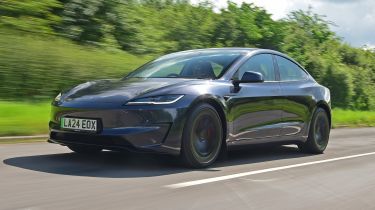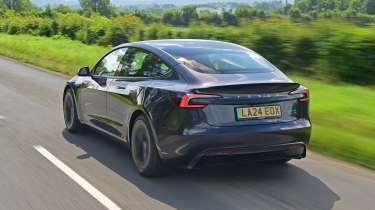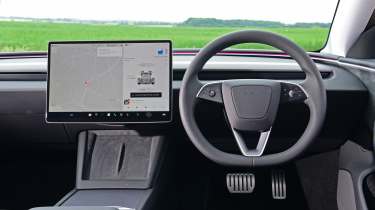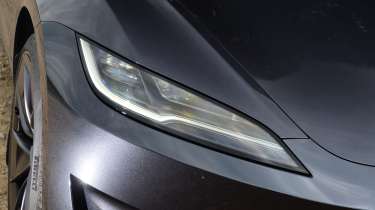Tesla Model 3 Performance review
The facelifted version of Tesla’s meanest machine is still supercar quick, but now it’s also much more dynamic
Pros
- Mind-bogglingly quick
- More dynamic to drive
- Not as expensive as you may think
Cons
- Brakes are difficult to modulate
- Doesn’t quite beat BMW’s offerings
- High seating position
| Range | Wallbox charge time | Rapid charge time |
| 328 miles | 10hrs 30mins (0-100%, 7.4kW) | 30mins (est.) (10-80%, 250kW) |
Tesla Model 3 Performance verdict
Nobody could ever question the previous Tesla Model 3 Performance’s capability whenever it was aimed in a straight line, but it didn’t quite do enough to threaten rivals from the likes of BMW when it came to driving dynamics. Now, though, the updated model has arrived and it’s far more than just a case of cosmetic nip and tuck. Tesla’s efforts to make the updated Model 3 Performance into a much more serious performance car are noticeable, and it’s much better to drive as a result. However, it’s still not quite able to reach the top of the class.
Details, specs and alternatives
The Tesla Model 3 Performance sits at the very top of the Model 3 line-up and, as we’ve come to expect from the brand's electric cars, it offers a distinctive blend of design minimalism, plenty of miles between charges and complete madness whenever you go near the accelerator pedal.
The high-performance EV world is still a fledgling one, but the Model 3 Performance already has its fair share of capable rivals. Models like the Audi RS e-tron GT, BMW i5 M60 and Porsche Taycan all provide similar levels of executive-style thrills.
The original Tesla Model 3 Performance wasn’t a bad car, but there was plenty of room for improvement when it came to making it genuinely exciting to drive rather than just fast. As well as the tweaked looks, the latest updates included a series of upgrades underneath, too, and these have indeed made some promising differences.
As part of the refresh there are a number of new exterior tweaks that have an impact on the way the Tesla drives. The body is lower than the standard car’s, and it’s adorned with a unique front bumper, a splitter, big air intakes, 20-inch alloy wheels and a carbon fibre lip spoiler.
There are a number of changes underneath, too, but Tesla is keeping quiet about the official figures. What we do know, is that the dual-motor powertrain produces 453bhp and it’ll launch the Model 3 Performance from 0-60mph in a ferocious 2.9 seconds, just as long as you’re flooring it in the right conditions.
Acceleration has never been an issue with the Tesla Model 3, so the brand has placed greater focus elsewhere this time around. Underneath you will find a unique adaptive suspension setup, along with extra touches including stiffer springs and chunky anti-roll bars. The brakes are now larger, too.
Powering all of this fancy performance gear is a 78kWh battery that’s good for up to 328 miles on the WLTP combined cycle, and, of course, this can be charged up via Tesla’s Supercharger Network.
The only major interior differences over the standard Model 3 are performance-oriented features such as sports seats and carbon-fibre detailing. In terms of tech, there’s the usual plethora of Tesla goodies which are mostly operated via the 15.4-inch central touchscreen.
Range, battery size & charging
| Range | Wallbox charge time | Rapid charge time |
| 328 miles | 10hrs 30mins (0-100%, 7.4kW) | 30mins (est.) (10-80%, 250kW) |
There’s only one battery available in the Tesla Model 3 Performance is a 78kWh unit, and this officially returns up to 328 miles on the WLTP combined cycle.
Tesla is keeping the official charging times on the down low, but it should take around half an hour to rapid-charge from 10 to 80 per cent at the Model 3’s peak 250kW DC charging rate. A full charge from a typical 7.4kW home wallbox charger should take around ten and half hours.
One of the biggest perks of Tesla ownership is having full access to the brand’s Supercharger Network, and there are plenty of these public charging stations dotted around the UK.
Running costs & insurance
Pretty much every combustion-powered car that can accelerate from 0-60mph in three or four seconds has an alarming thirst for fuel, so the fully-electric Tesla Model 3 Performance has a real advantage when it comes to running costs.
A full charge at home at a typical rate of 30p per kWh will set you back around £23, which is far less than a full tank of liquid fuel. That’s before taking the VED and BiK tax savings into account, too.
One area where Tesla owners won’t fare so well financially is when it comes to insuring their Model 3 Performance, as it sits in group 48. This is par for the course in this area of the market, though, as the BMW i5 M60 sits in group 49, while the Audi RS e-tron GT sits at the very top in group 50.
Performance, motor & drive
| 0-60mph | Top speed | Driven wheels | Power |
| 2.9s | 163mph | Four | 453bhp |
A car with the word ‘Performance’ in its name needs to shine in the performance section of a review, otherwise it’ll look incredibly silly. Fortunately for Tesla, the Model 3 Performance has never disappointed when it comes to outright speed.
Plant your right foot to the floor in the right conditions and the Model 3 Performance will blast past many supercars with its official 0-60mph time of just 2.9 seconds. Note that we said 0-60mph and not 0-62mph, and this is because it’s the official speed that’s used by Tesla. Don’t worry, though, as it really doesn’t take much longer to reach that extra 2mph.
Keep your foot down and you’ll soon reach a maximum speed of 163mph, delivered courtesy of a dual-motor powertrain that sends a combined 453bhp to all four wheels. Sadly, just like its charging times, Tesla keeps its torque figures close to its chest, but given just how much punch the Model 3 Performance has off the line, there’s definitely a lot of Newton-metres at play.
While the older Model 3 Performance was already more than comfortable on the drag strip, it lacked a bit when it came to providing full-on thrills on twisty roads. However, Tesla’s engineers have kept this firmly in mind when upgrading the new-look model, so it’s now much better at covering the corners. Improvements to the aerodynamics and suspension have transformed this Tesla into a far more dynamic machine, and it’s a lot more engaging and fun to drive as a result.
Selecting the new V3 ‘Track Mode’ allows the driver to make a range of adjustments to their heart’s content. These alterations include choosing how rear-biased the power delivery is, along with three stages of stability control. Tesla has also finally introduced adjustable regenerative braking.
Setting the adjustable suspension to sport mode helps the Tesla cope very well with more challenging stretches of road (or track), and keeps its weight firmly under control in the bends, which quickly inspires confidence. When you’re done having fun, the Model 3 Performance will then settle down into a pleasingly comfortable cruiser.
It’s by far the most convincing performance car to wear a Tesla badge to date, but the Model 3 Performance isn’t quite a class-leader just yet. Although it’s good to see adjustable brake regen on a Tesla, we feel that neither the regenerative nor physical brakes feel strong enough for a truly spirited drive.
The brakes themselves offer a good amount of stopping power, but we found them very difficult to modulate during testing. The switchover between regen and friction braking was also particularly vague.
Another area which leaves a bit to be desired is the steering. While it’s more consistent than the regular model’s, the Performance’s rack is a bit clumsily weighted and difficult to judge.
Interior, dashboard & infotainment
Take a look inside the Tesla Model 3 Performance and it'll be a pretty familiar sight for anyone who’s looked inside the regular facelifted Model 3. The overall minimalist theme remains, while a sizable 15.6-inch horizontal touchscreen sits at the centre of the dashboard.
There are a couple of noticeable unique differences to be found, though, the first of which is a spattering of carbon fibre trim. The most distinctive area of the Model 3 Performance’s cabin, though, is the seats. The brand’s new sports seats are standard-fit here and although they sit higher than we would have expected, they are very comfortable and supportive.
As with the rest of the line-up, the materials are all of a decent quality and the touchscreen looks good while being straightforward enough to navigate. The lack of switchgear will prove frustrating for some people though, especially the lack of indicator stalks.
Boot space, seating & practicality
The Tesla Model 3 Performance doesn’t make any sacrifices in terms of practicality compared to the regular Model 3, which means it’s reasonably family friendly in performance car terms.
There’s a generous 594-litres of boot space at the back, so you’ll be able to carry a surprising amount of stuff at some alarmingly high speeds. There’s an 88-litre ‘frunk’ under the bonnet, too.
The cabin, however, isn’t quite so spacious. Front seat passengers are well catered for when it comes to breathing room, but taller rear seat occupants will be constricted by the Tesla’s sloping roofline. The flat floor does mean that there’s a decent amount of legroom, though.
Reliability & safety rating
Euro NCAP awarded the pre-facelifted Tesla Model 3 a full five-star rating in 2019, and the updated car is riddled with standard safety and driver-assistance tech. Parking assistance, traffic-sign recognition and lane-keeping assist are all fitted as standard, while Tesla’s basic Autopilot technology is also thrown in.
The brand initially got off to a tricky start when it comes to reliability, but the Model 3 has improved by leaps and bounds recently. In fact, it was named as the seventh most reliable car in our 2024 Driver Power owner satisfaction survey and was the most reliable EV overall. Owners are a satisfied bunch, too, as the Model 3 was also ranked as second best car to own.









